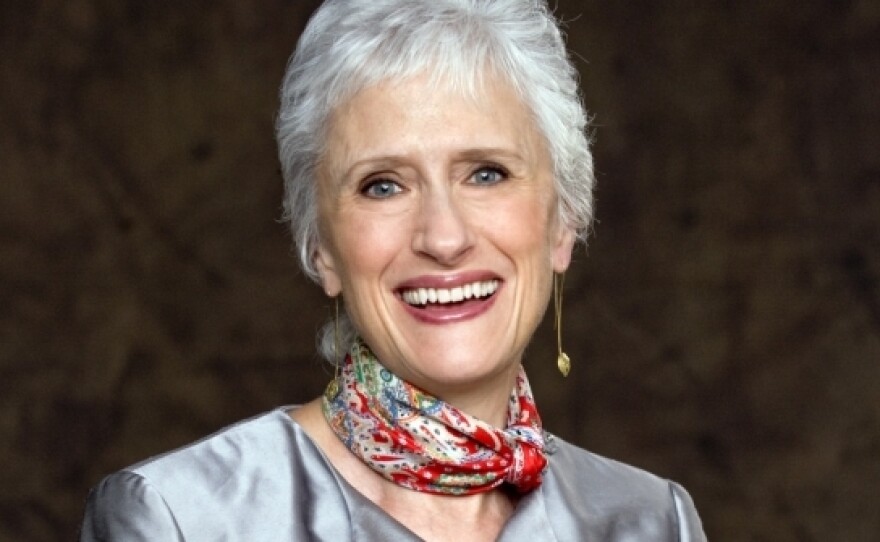The opening scene of the latest V.I. Warshawski novel confirms the worst fears of any parent whose daughter has been swept up by the Twilight craze: Namely, books can be dangerous. It's a dark and stormy summer night in Chicago, and V.I. is tracking a bunch of 12- and 13-year-old girls through an abandoned cemetery. The tweens — all members of a reading group transfixed by a series about a supernatural shape-shifting character called Carmilla, Queen of the Night — have sneaked out of their respective houses to do something secret. V.I. finds them in the cemetery, getting ready to perform an initiation rite on one of their members. But just as V.I. is about to intrude on the mumbo jumbo, one of the girls screams and points to a nearby gravesite. There, a dead man is laid out on a stone slab, a metal rod protruding from his chest. A few minutes earlier, V.I. had glanced at the slab as she crept up on the girls, but she'd thought the corpse was a statue. In middle age, V.I.'s eyesight isn't what it once was.
All of V.I.'s other powers, however, as well as those of her creator, Sara Paretsky, are as vital and limber as they were 20 years ago when she first charged down the mean streets of Chicago and into hard-boiled history in her debut adventure, Indemnity Only. If anything, the Warshawksi novels have only grown better: more ambitious in their construction and fiercer both in their feminist politics and in their commitment to storylines about social justice. A typical Warshawski investigation not only zooms in on the genre's "usual suspects" (greedy opportunists, professional con artists, dysfunctional families), but also the larger social ills plaguing contemporary America. Recent novels have explored the subjects of homelessness, illegal immigrants, domestic violence and the unfulfilled promises of the civil rights movement. Breakdown, the 18th novel in the series, tackles the ever-widening class divide in America, as well as the unchecked power of media pedagogues. If you're a fan of Bill O'Reilly, you probably won't like Breakdown, since he is clearly a model for the faux populist, right-wing ranter Wade Lawlor, who is pilloried in the novel. Then again, O'Reilly's audience and Paretsky's probably don't overlap a whole lot anyway.

Back to that grisly cemetery scene: One of the girls present at the Carmilla ritual turns out to be the daughter of a liberal candidate for the U.S. Senate. Another is the granddaughter of Chicago's wealthiest philanthropist. As talking-head Lawlor revels in ripping apart the parenting skills of these high-profile bleeding hearts, Warshawski works furiously to figure out what the dead man — a private investigator like herself! — was doing in the cemetery that night. Was he tailing one of the girls? If so, why? And, who plunged that Dracula-like stake through his solar plexus on the very spot where the girls were hoping to become shape-shifters?
What seems to be a single, if ornate mystery turns even more complex, with subplots sprouting up faster than mold on a mausoleum. Wade Lawlor's fixation on his long-ago murdered sister becomes pertinent to V.I.'s investigations, as does the Holocaust past of that elderly philanthropist. In the midst of her already hectic detecting, V.I. is interrupted by a manic phone message from her old law school friend Leydon Ashford. Here's how V.I. recalls her former best friend:
"Leydon Ashford was the first person I ever encountered who had two last names. We'd both grown up along the shores of Lake Michigan. The difference was, her family owned an eighteen-room mansion backing up onto three hundred yards of private beach, whereas the Warshawskis' five-room bungalow was separated from the lake by a century of cyanide-laced landfill."
The friendship atrophied as Leydon descended deeper into mental illness. Now Leydon is begging for help, and V.I.'s belated response takes her deep into another Gothic site: a massive sanitarium on the outskirts of Chicago where, coincidentally, that very same detective who turned up dead in the cemetery was seen prowling around the halls after Leydon. Too strange.
The V.I. Warshawski series has always offered intellectual pleasures, as well as the reliable delights of watching our heroine lob just the right comeback to even the most incidental remarks uttered by snobs, racists and misogynists. (Breakdown affords V.I. plenty of opportunity to mouth off to the likes of Wade Lawlor and his cronies.) Underlying all the witty repartee and frantic detective work, however, is a troubling vision of an America wracked by divisions even a supersleuth like V.I. can't solve. Think of that image of the two beachfronts abutting Lake Michigan, one private; the other contaminated by landfill. In Breakdown, no amount of cosmic cleaning up by V.I. can contain the toxins or level the playing field.
Copyright 2023 NPR. To see more, visit https://www.npr.org. 9(MDAzMjM2NDYzMDEyMzc1Njk5NjAxNzY3OQ001))






